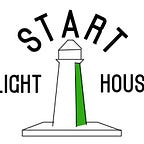The Backstage Series: The Creation of our Literacy Kits and Racial Justice Program
Welcome back to Start Lighthouse’s Backstage series! This week, I had the pleasure of sitting down with Rina Madhani, Executive Director and Co-Founder as well as Jonathan Isla Rampagoa, Development and Communications Intern here at Start Lighthouse. Together we discussed the creation of our literacy kits and racial justice curriculum while reflecting on the public school experience in New York.
“During a time of widespread school and library closures last March, we constantly thought about how many of our former students actually had books at home and what they were actually reading,” said Rina. That’s what led us to think about how we could bring books along with additional learning materials that could be useful for parents and caregivers.” Rina having begun her career as an educator in the South Bronx was sensitive to the struggles of children, particularly in regards to access. Access to high-quality print materials and children’s books has been increasingly difficult to come by within the community. She stressed Start Lighthouse’s focus on offering brand new and culturally responsive books to students, “We felt our students were really deserving of this as books can often be perceived as a luxury item for many families who are either rent-burdened or living in poverty.”
Since launching amidst the pandemic, Start Lighthouse has been a supportive resource for students and families in the Bronx, particularly during the closure of in-person schooling and transition towards remote-learning. The distribution of our customized literacy kits and the creation of our racial justice literacy program have played a critical role for teachers, students, and families as we navigate a time of profound social injustice in America.
The pandemic created a difficult learning environment for many children, and it became challenging for them to receive the same educational support at home. The public school system was not prepared to cope with the transition that the pandemic brought to the learning structure. “The school lockdowns that started in the spring of 2020 reduced instructional and learning time, which are known to impede student performance, with disparate impacts on different groups of students”( the Economic Policy Institute). However, with the support of Start Lighthouse, many children and schools in the Bronx have been able to adapt to this new way of learning.
It became apparent during the pandemic that students from less affluent neighbourhoods did not have easy access to learning resources. The public school system in New York was already lacking in terms of support before the pandemic began, especially in low-income areas such as Queens and the Bronx which are very culturally diverse. Jonathan provided his perspective on this, “In general, the educational support you receive is really dependent on where you go to school and how the system treats you.” Jonathan notes, “This is why Start Lighthouse focuses on the Bronx specifically because it is actually the second poorest congressional district in the country.” Jonathan has grown up and attended school in the multicultural and diverse community of Queens. He quickly noticed the uneven distribution in terms of educational resources offered in this area in comparison to more affluent neighbourhoods. “In Manhattan, Columbia is there, NYU is there, The New School is there, Cooper Union is there, all those big-name schools are there. This requires for high schools and middle schools to also be well-resourced” he comments.
“The school community is very multi-ethnic; it is extremely diverse, but the system itself is still very segregated. A majority of black and brown students go to less funded public schools. And it creates a very systematic pipeline.”
Start Lighthouse continues to make great strides in its efforts to provide these resources for all students despite their zip code. Their racial justice literacy curriculum specifically ensures that students can discuss the discrimination and transgressions that they witness around them. Especially considering the widespread impact or the Black Lives Matter Movement last year and the increased awareness of racial injustice and police brutality throughout the nation. These are circumstances that children are very aware of, and it is relevant for them to discuss these issues and understand these realities. “We were first thinking how is our curriculum going to align with national state standards,” Rina states, “but more importantly how are we making this curriculum accessible to all learners? What kind of components need to be integrated so students who have learning disabilities or are English language learners still have access?”
Start Lighthouse has a fantastic team that has come together to ensure that the lessons are designed to reach all students. Rina comments on how our student workbooks incorporate features such as increased visuals to make it easier for students with learning disabilities to process and understand. “There is always another pathway, another opportunity to make it easier for students to express their understanding and we are always thinking about how to explore these possibilities,” she adds.
Start Lighthouse is nearing its first anniversary this March. Our first set of literacy kits were assembled in Chicago by our team, in the basement of Rina’s home. Since then we have come a long way. We had a little over 300 books back then, and now we have collected up to 3453 brand-new culturally responsive books. We’ve had the opportunity to connect with students and families within the Bronx during our community distribution events.
Jonathan recalls his experience at our event last August during which a little girl could not stop smiling once she received her customized literacy kit, “I talked to that girl and she was extremely enthusiastic. Just interacting with the kids was definitely a bonus!”
These are the moments that are truly special.
